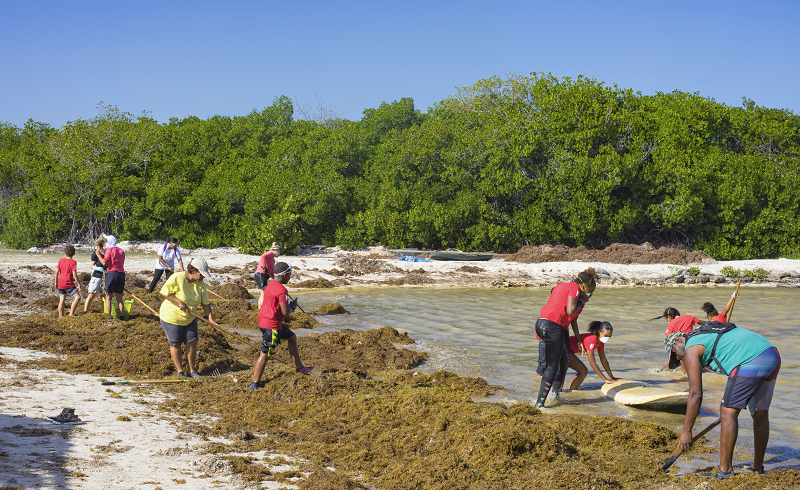
The ambition of this new constellation of WUN partners is to raise awareness on sargassum and take research impact to the next level.
SARCAP builds capacity within West African schools, local communities, research institutes and environmental management organisations to monitor, manage and use sargassum. Sargassum is a brown seaweed (macroalgae) that has proliferated in the tropical Atlantic since 2011. Vast rafts of holopelagic sargassum – some the size of 200 adjoining football pitches – have seasonally washed ashore and decomposed on beaches requiring extensive clearing or management. The seaweed causes social, environmental and economic damage in all affected areas (from Mexico to Ghana), but little is known about the causes and consequences of sargassum in coastal W. Africa, e.g. the frequency or location of events, the biology of the sargassum, the impacts, and potential uses.
Our project specifically aims to create and mobilise a cohort of sargassum champions in W. Africa to delve into this new normal. The champions have two objectives. First, to train trainers across W. Africa to monitor the distribution of sargassum, identify species, provide basic knowledge of seaweed biology, and translate scientific data into information to enable value-extraction from Sargassum. The second objective of the champions is to develop online training resources to engage communities and schools in monitoring, identifying and reporting sargassum to develop citizen science in W. Africa. The project team will also develop resources to train scientists and professional researchers to undertake larger-scale surveillance of sargassum using technologies (such as drones) and field-based methods.
We will draw on a range of expertise across our WUN+ research partnership which spans three continents, in: Mexico (TEC Monterrey), Jamaica, Florida, the UK (Universities of Southampton and York) and Ghana (University of Ghana).
To deliver these aims, SARCAP will develop online training resources, tailored for West Africa, train trainers in West Africa, and collect data on sargassum in West Africa. We will:
- develop resources to train scientists and professional researchers to undertake larger scale surveillance of sargassum using technologies (such as drones) and field-based methods.
- support partners to engage communities and schools in monitoring, identifying and reporting sargassum
Our ambition is to work with West African children and researchers to share knowledge about sargassum today, so that, in five to ten years’ time, a new generation of West African researchers and entrepreneurs will be capable of being deeply involved in the sustainable economic development of their native countries through the Blue Economy, particularly in coastal communities.
This project will support the nascent Gulf of Guinea Sargassum network, which in its inception meeting noted the absence of evidence of sargassum impacts and options for management in West Africa.
To find out more, head to: https://www.sartrac.org/
Selected outcomes
- Teaching material on the biology of pelagic sargassum for school children (years 6-9). Available here.